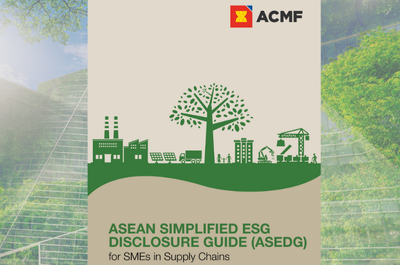The ASEAN Simplified ESG Disclosure Guide for SMEs in Supply Chains (ASEDG) Version 1, https://www.theacmf.org/images/downloads/pdf/ASEDG%20100425.pdf, said the 38 priority disclosures covering the ESG pillars are divided into Basic, Intermediate and Advanced categories by each topic to cater for different levels of sustainability maturity in companies.
“There is no mandatory timeline for the disclosures and adoption is voluntary. Disclosures may be updated if stakeholder needs change,” it said.
The guide said the disclosures are applicable across all industries, with different levels of importance and priority.
“Every company is encouraged to determine the materiality of the topics and associated disclosures relevant to the company,” it added.
Under the Environmental pillar, topics include emissions, energy, water, waste and materials.
The guide said the reporting requirements for Greenhouse gas (GHG) emissions are based on the requirements of the ‘GHG Protocol Corporate Accounting and Reporting Standard’ and the ‘GHG Protocol Corporate Value Chain (Scope 3) Accounting and Reporting Standard’.
These two standards are part of the GHG Protocol developed by the World Resources Institute (WRI) and the World Business Council on Sustainable Development (WBCSD).
The disclosures in the topic of energy can provide information about a company’s impacts related to energy, and how it manages them.
Those in the topic of water only cover water withdrawal since discharge may not be relevant for most companies. It is, however, encouraged for companies to go beyond these disclosures if the company withdraws significant amounts of water directly from natural sources or discharges significant amounts of water/ effluents.
On the topic of waste, the disclosures are designed to help a company better understand and communicate its waste-related impacts, and how it manages these impacts. These require information on how the company prevents waste generation and how it manages waste that cannot be prevented, in its own activities and upstream and downstream in its value chain.
The disclosures in the topic of materials can provide information about a firm’s impacts related to materials, and how it manages these impacts.
“Companies shall take into consideration regulatory guidance such as those prescribed by laws or regulations. Companies may also consider, where relevant, the adoption of and alignment with local and international guidelines,” the guide said.
ESG’s Social pillar focuses on human rights and labor standards; employee management; diversity, equity and inclusion; occupational health and safety; and community engagement.
“The presence and effective implementation of policies for eliminating all forms of forced or compulsory labour are a basic expectation of responsible business conduct. Companies with multinational operations are required by law in some countries to provide information on their efforts to eradicate forced labour in their supply chains,” it added.
The disclosures for the topic of employee management address the scale of a company’s investment in training and the degree to which the investment is made across the entire employee base.
“It also reflects the company’s commitment to providing fair compensation that meets or exceeds local minimum wage requirements, with regular reviews to ensure ongoing compliance with the prevailing minimum wage laws or regulations,” the guide said.
On the other hand, the Governance pillar covers governance structure, policy commitments, risk management and reporting, anti-corruption and customer privacy.
The guide said good and effective corporate governance has wide ranging influence and impact on the corporate and real economic sector, including listed and non-listed companies, which would enhance decision-making, thus leading to better performance in commercial terms.
“Clear policy commitments, supplemented by relevant internal processes and guidance for stakeholders, demonstrate the determination of the companies in implementing responsible business conduct throughout the organisation and supply chain, thus ensuring that companies are not engaged in unethical behaviour or illegal activities,” it added.
PHILEXPORT News and Features
Published: May 30, 2025
Published: May 30, 2025
June 05, 2025













